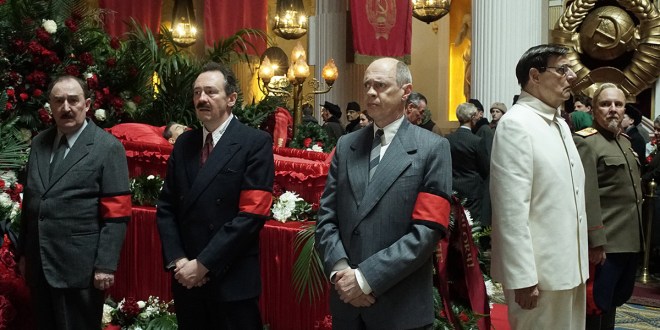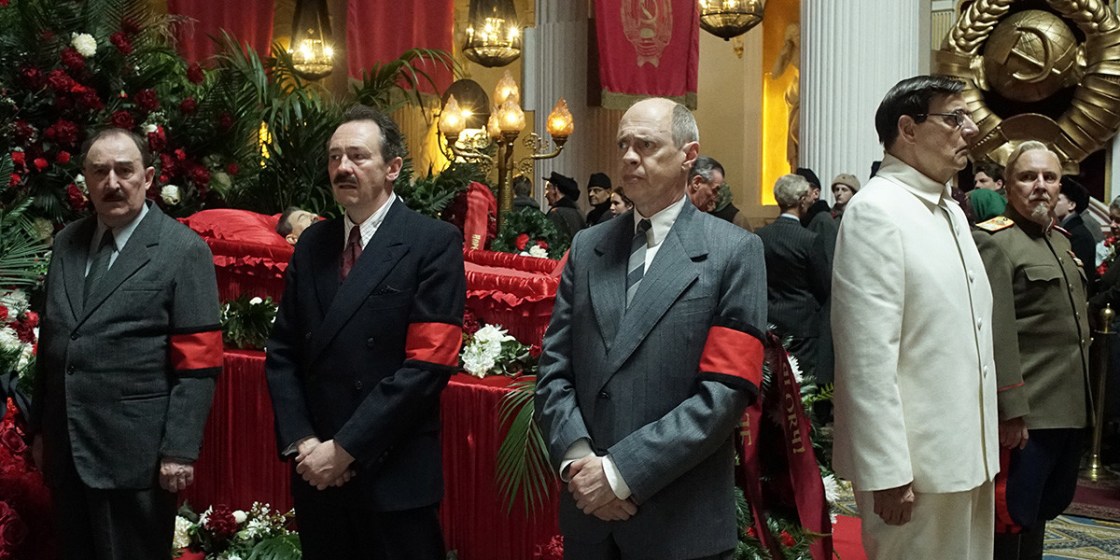What does a serious comedy look like?

It was a question I’d never even considered until I sat down to watch The Death of Stalin; comedies could be dark, sure, or they could approach serious topics in a humorous way, but I had never seen a movie I could rightfully describe as a “serious comedy” before. Something where the dark stuff wasn’t just there to contrast to the humour or to drag out a few of those “shocked horror” laughs – a movie where the darker material directly informs the comedy, where both the humour and the bleakness are irrevocably wrapped up in each other. But that’s what The Death of Stalin achieved, and it’s bloody brilliant.

The Death of Stalin does what it says on the tin, following the higher-ups of the Russian cabinet as they scramble to reform themselves after Stalin kicks the bucket. And, I’ll be honest, when I first heard of this movie I was concerned: I see TV shows and movies invoking real history in a flippant way far too often (Bridge of Spies is the most recent example I can think of, with shows like American Horror Story also throwing around horrific real life events to prop up thin camp), and it’s not that I think that every bad thing that has ever happened should be treated with a solemn, po-faced respect, but it leaves a bad taste in my mouth to see real-life tragedy and cruelty repurposed to fit a cleaner narrative. History, and in particular sprawlingly violent regimes like the one Stalin led and passed on, is rarely simple, but we generally want the stories we watch to give us a hero (or at least a recognisable protagonist), and a solid three-act structure. Look at something like Rush, which was let down completely by the fact that the real-life story it was based on just didn’t have a decent ending: finding stories, characters, and settings that move seamlessly from the real world to screen is tough, even when the stories may seem engaging on paper.

The first thing that The Death of Stalin does right, in this respect, is to embrace it’s unreality. I think the casting was the first step towards this, with American thesps like Steve Buscemi and Jeffery Tambor stepping up to take leading roles and keeping their regular accents, creating this complete dissonance that keeps you from falling into the trap of thinking that this is some relatively accurate repurposing of real life: Jason Isaacs, as army leader General Zukhov, struts in and shouts in a thick Yorkshire accent, a nod to Zhukov’s own Georgian heritage; The Death of Stalin sees real life and twists it into something recognisable but just different enough that they can get away with the absurdly funny comedy they wring out of almost every scene. If you’ve seen writer-director Armando Iannuci’s work on The Thick of It, you know what to expect here – deeply unlikeable and yet utterly watchable characters, and comedy drawn from the blisteringly sharp takes on political minutiae. Like The Thick of It, The Death of Stalin gives itself just enough space from real life to keep it from accusations of inaccuracy, but not so much that it isn’t uneasily familiar.

But the real genius of The Death of Stalin isn’t the comedy, even though it is, by far, one of the funniest films of the year: it’s the darkness. This is a movie that leans unflinchingly into the darker corners of the world it’s trying to recreate. For every shot of Steve Buscemi as Kruschev scheming while jogging nervously through a forest, there’s a scene of Levrinty Beria (an utterly chilling, utterly compelling Simon Russel Beale) calmly preparing a woman for the rape he’s about to perpetrate against her. For every gag about Michael Palin kneeling in piss, we’re reminded of the truly unthinkable atrocities that were being committed by Stalin’s regime – and that were all too easily repurposed by the people we spend the move with to fulfil their own machinations. The entire movie takes place under this uneasy, unsettling air of paranoia, filling the pauses between jokes with a sense of mounting dread and the knowledge that this is how it has been for a long enough time that people have almost stopped questioning it.
And it’s there that it’s real power lies: yes, the jokes are funny and sure, the performances are great, but it’s capturing with precise and extraordinary clarity the everyday horrors committed by the Stalinist regime that makes The Death of Stalin one of the best comedies in recent memory.
By Louise MacGregor
If you enjoyed this article and want to see more stuff like it, please consider supporting us on Patreon!

Reblogged this on The Cutprice Guignol.
LikeLike